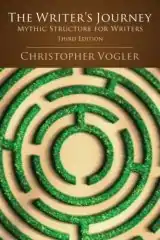The Writer's Journey: Mythic Structure for Writers
The Writer's Journey: Mythic Structure For Writers is a popular screenwriting textbook by writer Christopher Vogler, focusing on the theory that most stories can be boiled down to a series of narrative structures and character archetypes, described through mythological allegory.[1] Vogler based this work upon the writings of mythologist Joseph Campbell, particularly The Hero with a Thousand Faces, and holds that all successful films innately adhere to its principles. The book was very well received upon its release, and is often featured in recommended reading lists for student screenwriters.[2][3][4]
 | |
| Author | Christopher Vogler |
|---|---|
| Country | United States |
| Language | English |
| Genre | Non-fiction |
| Publisher | Michael Wiese Productions |
Publication date | 2007 |
| Media type | Paperback |
| Pages | 407 |
| ISBN | 978-1-932907-36-0 |
| OCLC | 154677482 |
| 808.2/3 22 | |
| LC Class | PN1996 .V64 2007 |
History
The book stems from a seven-page studio memo, "A Practical Guide to The Hero with a Thousand Faces",[5] based on Campbell's work, which Vogler wrote while working for Disney. An earlier edition, The Writer's Journey: Mythic Structure for Storytellers and Screenwriters, was published in 1992. Vogler revised the book for a second release in 1998 and changed the title to The Writer's Journey: Mythic Structure for Writers. The third edition, published in 2007, included a new introduction, new artwork and analysis of recent, popular motion pictures. In July 2020, the 25th Anniversary Edition will be published, which, according to the new edition's back cover, will include new sections and topics.[6]
Title
The title of the book was influenced by a number of sources. The first came from Campbell's text, The Hero with a Thousand Faces. Later, in the 1980s, two documentaries would introduce the phrase The Hero's Journey into popular discourse. The first, released in 1987, The Hero's Journey: The World of Joseph Campbell was accompanied by a 1990 companion book, The Hero's Journey: Joseph Campbell on His Life and Work. The second was Bill Moyers' series of seminal interviews with Campbell, released in 1988 as the documentary (and companion book) The Power of Myth.
Summary of content
The archetypes
The first part of the book describes eight major character archetypes in detail.[7] Those are:
- Hero: someone who is willing to sacrifice his own needs on behalf of others
- Mentor: all the characters who teach and protect heroes and give them gifts
- Threshold Guardian: a menacing face to the hero, but if understood, they can be overcome
- Herald: a force that brings a new challenge to the hero
- Shapeshifter: characters who change constantly from the hero's point of view
- Shadow: character who represents the energy of the dark side
- Ally: someone who travels with the hero through the journey, serving variety of functions
- Trickster: embodies the energies of mischief and desire for change
Stages of the Journey
The second part describes the twelve stages of the Hero's Journey.[7] The stages are:
- The Ordinary World: the hero is seen in their everyday life
- The Call to Adventure: the initiating incident of the story
- Refusal of the Call: the hero experiences some hesitation to answer the call
- Meeting with the Mentor: the hero gains the supplies, knowledge, and confidence needed to commence the adventure
- Crossing the First Threshold: the hero commits wholeheartedly to the adventure
- Tests, Allies, and Enemies: the hero explores the special world, faces trial, and makes friends and enemies
- Approach to the Innermost Cave: the hero nears the center of the story and the special world
- The Ordeal: the hero faces the greatest challenge yet and experiences death and rebirth
- Reward: the hero experiences the consequences of surviving death
- The Road Back: the hero returns to the ordinary world or continues to an ultimate destination
- The Resurrection: the hero experiences a final moment of death and rebirth so they are pure when they reenter the ordinary world
- Return with the Elixir: the hero returns with something to improve the ordinary world
See also
- Dan Harmon, eight-step Story Circle
- John Yorke, author of Into The Woods: A Five-Act Journey Into Story, another book about the parallels between myths and screenwriting
- Three-act structure
References
- BBC Writers Room staff. "Christopher Vogler's screenwriting workshop". BBC Writers Room. Archived from the original on August 18, 2007. Retrieved 2007-08-18.
- Exposure staff. "Recommended Reading". Exposure.co.uk. Retrieved 2007-08-06.
- De Montfort University. "Recommended Reading". Demontfort University Official Website (Humanities). Retrieved 2007-08-06.
- Editing Service Staff. "Books about Writing". OgleMoore staff. Retrieved 2007-08-06.
- Vogler, Christopher. "A Practical Guide to The Hero with a Thousand Faces". An online copy of the memo.
- Michael Wiese Productions. "The Writer's Journey – 25th Anniversary Edition: Mythic Structure for Writers". MWP.com. Retrieved 2020-06-04.
- The Writer’s Journey: Mythic Structure for Writers, Third Edition, Vogler, Christopher, 2007.